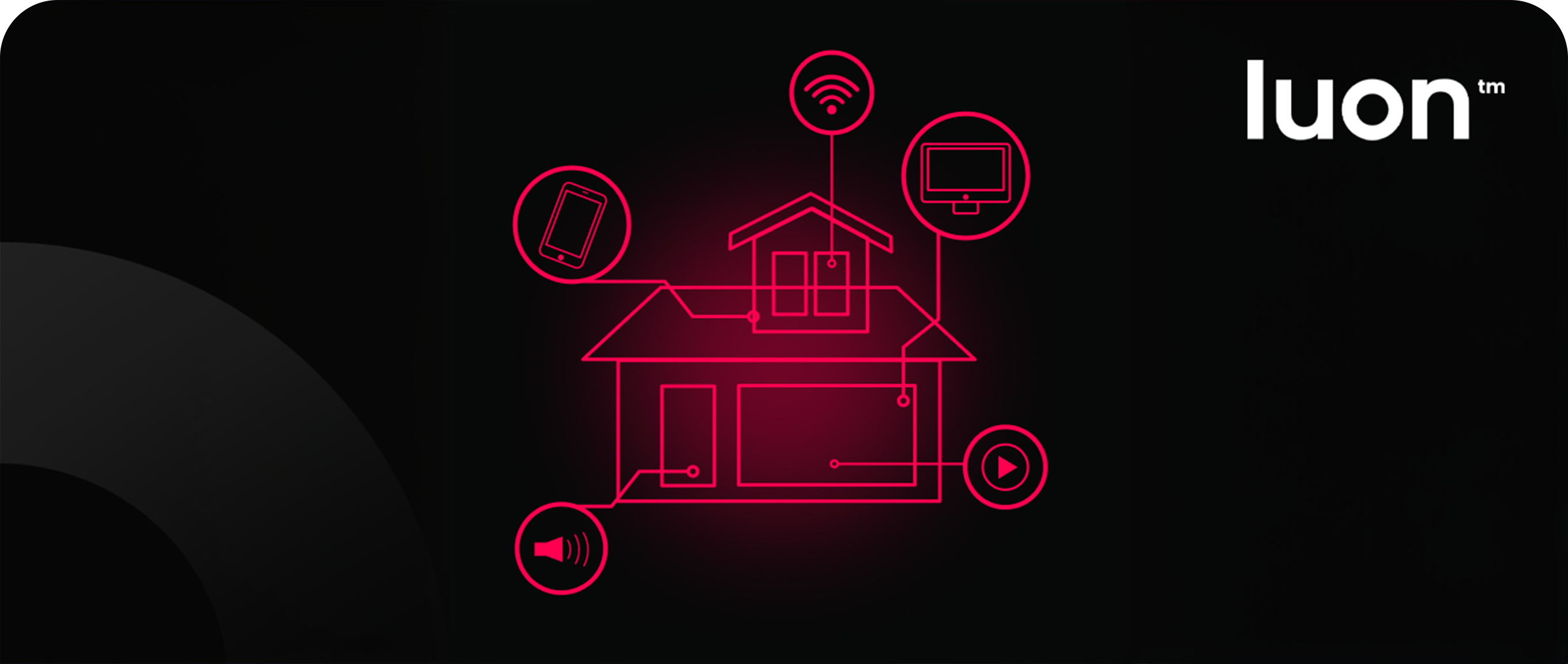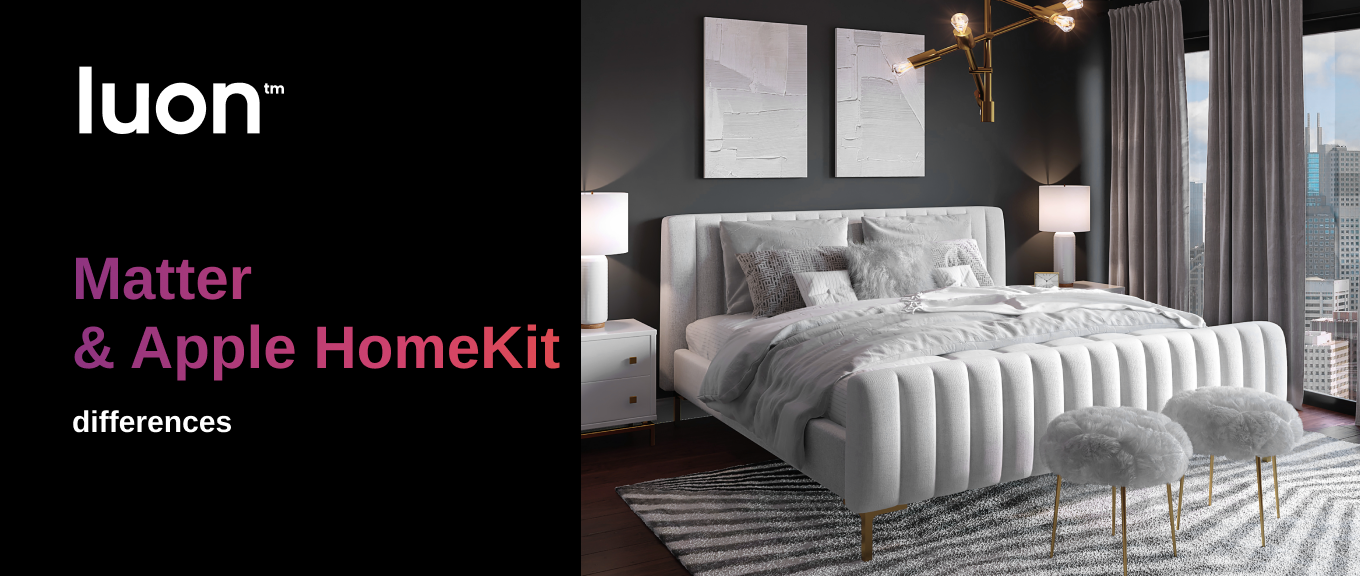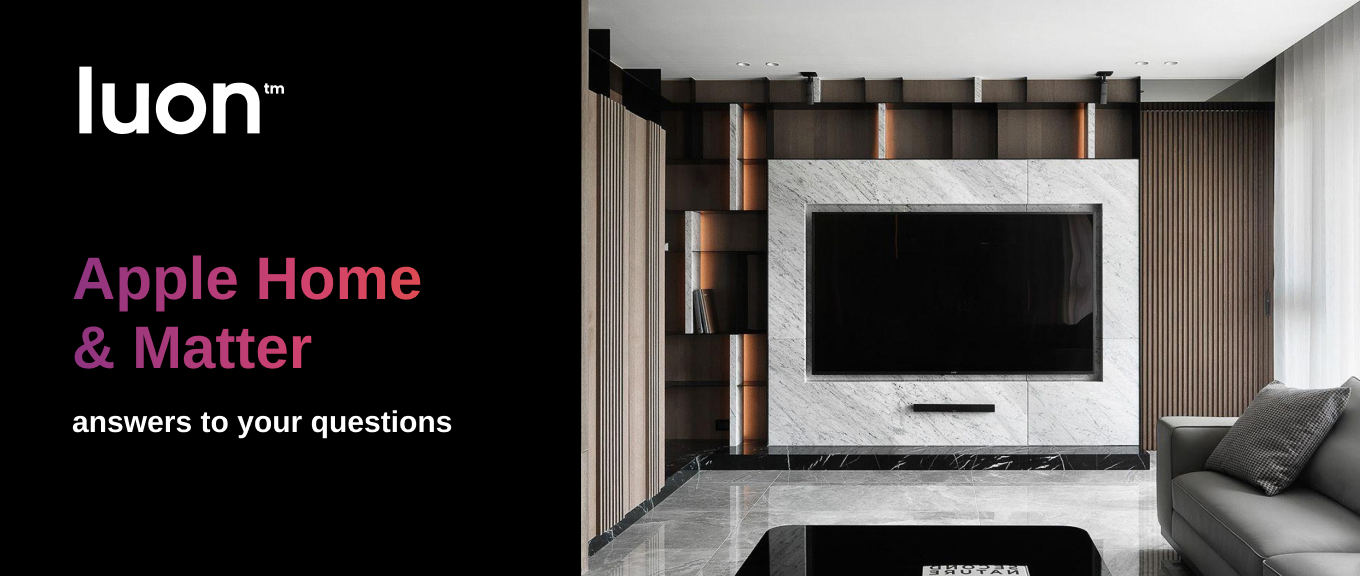Apple Home, Matter and HomeKit. Differences and similarities

We created this text (as well as the podcast episode) in response to your questions. You often ask us in emails and on Messenger about what Matter, Apple Home, and HomeKit, which appear in our posts and articles, are. We see the need to organize information and convey knowledge on this topic in a clear way. We hope that our article will clarify any doubts for you!
Apple Home & Matter

Let's start from the basics. Before the emergence of Matter in the modern world of smart home systems, platforms such as Google Home, Amazon Alexa, and Apple HomeKit dominated. Each of them had its dedicated application for managing the smart home, and each offered unique solutions.
The manufacturer who wanted to create a device compatible with all three systems was forced to obtain three different certifications and adapt the software for each of these ecosystems. As you can imagine, this was not only time-consuming but also costly, often even uneconomical. Additionally, attempting to meet the requirements of all three systems often resulted in limiting the number of functions, which was most felt by Apple HomeKit users.
Those times are slowly becoming a thing of the past. The emergence of Matter has changed the entire situation. Now, for a device to cooperate with each platform, it's sufficient to obtain just one certification – Matter.
And where does Apple Home fit into all of this? Well, it's a platform that, on one hand, supports devices compatible with Apple HomeKit and manages them, and on the other hand, it also handles Matter devices. If it weren't for this fact, it would be necessary to have yet another application dedicated solely to managing Matter devices. Matter is a standard for communication and logic, not a system – but we'll talk about that later. Thanks to Apple Home, we can manage and automate devices compatible with both Apple HomeKit and Matter using applications like Home and others, such as LuHome.
Are you okay with the basics? Now you can read our replies to most popular questions from our users.

Why isn't there a separate application for Matter?
Matter is not a system but a communication and logic standard, a set of principles according to which devices are built and connected to each other. A similar standard is Apple HomeKit.
The system that manages all of this, enabling the creation of basic elements like automations, is Apple Home. That's why Matter can't function independently but must be integrated with some overarching system, such as Apple Home, Google Home, Alexa, or Samsung Smart Things.
Will HomeKit become irrelevant after the introduction of Matter?
The answer to this question is simple: No, at least not in the near future. This is mainly because Matter is still an immature standard. It doesn't offer, and for some time, it won't offer the features available in HomeKit. The older standard will undoubtedly generate fewer problems and provide fewer disappointments than the still new Matter, especially in the beginning.
What will happen in three years? We'll see. For now, we have high hopes for Matter, but at the same time, we are aware that its capabilities will be limited for the time being. We will monitor the steps Apple takes towards developing the new standard and potentially adding new features to HomeKit. You can certainly expect up-to-date information from our side!
Does Matter have anything to do with Thread?
This is a question we often encounter and one that always surprises us. Comparing Matter and Thread is like comparing HomeKit with WiFi or Bluetooth. Possible explanations for these misunderstandings might be that both names started to appear around the same time. However, Matter and Thread are definitely not the same.
Matter is a standard for the logic of communication between devices, while Thread is one of the methods (similar to WiFi) through which these devices can communicate. Thread is a tool used, among others, by Matter and HomeKit.
Can devices compatible with Matter be automated in Apple Home?
Yes, it is possible. Both devices compatible with Matter and those compatible with HomeKit can be automated using Apple Home. This is because Apple Home is a system, not just a communication and logic standard, as is the case with Matter and Apple HomeKit.
What about the automation of Matter devices in Apple Home, Google Home, and other ecosystems?
Each of these ecosystems implements automation for Matter-compatible devices in its unique way. Although you can add a single device to multiple systems and manage them, individual automations will not interact. With improper configuration, they may even interfere with each other. In summary, automations on each platform are invisible to other systems and will never cooperate with each other.
Are devices compatible with Matter visible in third-party applications like LuHome?
Yes, they are visible. From the beginning, Apple emphasized (and indeed implemented) that the API for applications would not change and would be the same as in HomeKit. Matter devices communicate in the same way as HomeKit-compatible devices.
This means that application developers do not need to make any changes. Their software will still be able to control Matter-compatible devices. If no changes are made to the application, the devices will be supported at the same level as HomeKit-compatible devices.
However, it's worth taking advantage of the new opportunities – Apple has been providing additional features available only for Matter to application developers for some time.
Are devices compatible with Matter compatible with Apple HomeKit?
No, that is not the correct phrasing. HomeKit and Matter serve the same purpose – they are standards for communication and logic. So, you cannot say they are compatible. However, both standards are compatible with Apple Home. The differences between Matter and Apple HomeKit may not be immediately obvious. To make it easier to understand, here are a few examples:
- To connect a Matter-compatible device to the Apple Home system, you need to have an Apple Accessory Gateway. For HomeKit-compatible devices, this requirement doesn't exist. You can add them to the Apple Home system using just an iPhone or iPad.
- Another significant limitation is that when you disconnect all Accessory Gateways from power, you cannot control Matter devices that were previously added to the Apple Home system – they will show "no response" status. This problem does not occur with HomeKit devices – even after disconnecting Accessory Gateways, you can still control them on the local network.
- In some situations, Matter-compatible devices do not support features that were available for HomeKit devices. A good example is the Nanoleaf smart bulbs and their Adaptive Lighting feature, which is only available for HomeKit products. So, the Matter standard doesn't always mean broader capabilities. In this described case, users lose out on such a change.
Matter standard does not have an equivalent for the feature of recording video camera footage, which is available in the HomeKit system.
Of course, you can find many more examples of limitations, but these few should be enough to provide context.
Debunking Myths About Matter
The introduction of the Matter standard is a significant event in the world of smart homes. It's no wonder that it has been the subject of many discussions since its inception. However, the growing popularity of this technology also has its downsides – there are many myths and imprecise information surrounding Matter. Our goal today is to dispel these myths, explain their origins, and provide you with only accurate information.
How do users' perceptions of Matter shape up and how do they relate to reality?
- With Matter, no bridges or hubs will be needed. This is certainly not the case for one simple reason. Matter supports communication standards such as Ethernet, WiFi, Bluetooth, and Thread, all of which transmit information using IP. Let's consider the most common devices on the market. Most likely, these are ZigBee-based devices that are not compatible with Matter. To enable communication between these accessories and Matter devices, a bridge is necessary.
- A Matter device added to Apple Home can be quickly moved to Google Home and other ecosystems. | One of the main advantages of introducing Matter is the ability to use devices across different platforms. Although it's possible, it's not as straightforward and convenient as it might seem. Firstly, you can't instantly transfer your entire smart home to another platform. It's a process that requires moving devices individually, which is quite time-consuming. The word "transfer" here might be somewhat misleading because it's more about enabling access to devices on other platforms. The actual transfer process – removing from one system and adding to another – is even more complex.
- Matter-compatible devices will be cheaper than those compatible with HomeKit. | It's not possible to make a definitive statement that Matter devices will be cheaper. It all depends on the pricing strategy of individual manufacturers. Even among HomeKit-compatible devices, you can find products at various price points with different features. There's no basis for claiming that Matter accessories will be cheaper. It's likely not the case, partly due to the high certification costs.
When will Matter become more significant?
Everything we're discussing here pertains to the future. For HomeKit users, Matter currently has limited significance. It doesn't introduce new features that were missing in HomeKit, and its potential should be seen more as a promise.
The development of individual platforms is crucial here. For example, it's worth keeping an eye on what's happening with Google Home. This system is evolving and offering users more automation and scripting capabilities. That's why the significance of Matter in this platform may increase soon.
What about benefits for HomeKit users? When can they expect real changes brought by Matter? We estimate it will be at least 2-3 years.
One thing is certain – the Matter standard topic will come back. Are there any topics you'd like to read or hear about? Let us know, and we will incorporate your questions and suggestions into our plans!
